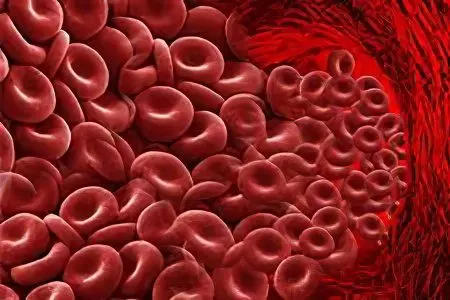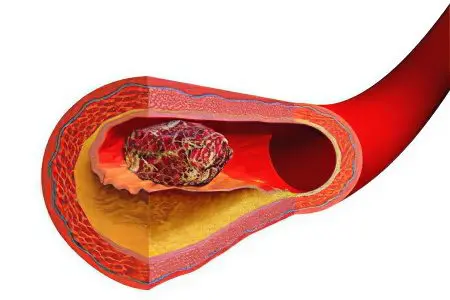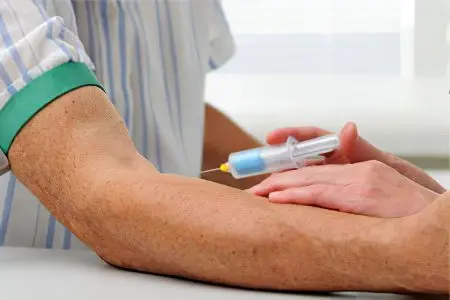Contents

Hypercoagulability is a state of the blood system in which its coagulation system exhibits increased activity. Hypercoagulability can develop on its own or be a symptom of another disease. With pathological activity of the blood coagulation system in the body, the risk of blood clots increases. Such blood clots are loose and not elastic.
Blood is a fluid that carries oxygen and nutrients to organ tissues. Blood is represented by two components: plasma and cells that float freely in it. In the quantitative ratio “blood cells – plasma” looks like “4:6”. If this ratio is violated, and the number of cellular elements increases, then this leads to thickening of the blood.
It is impossible to ignore such a condition, since it carries a threat to human health and life. Increased blood viscosity is dangerous for body tissues, as it disrupts the processes of their oxidation and regeneration.
Primary hypercoagulation refers to the pathology that is inherited. Secondary hypercoagulation develops during life due to the impact on the body of various pathological factors.
What can provoke the development of hypercoagulability?

Hypercoagulation of blood can be caused by a wide variety of reasons, including:
Carrying a child. Blood thickens due to changes in the body.
Vomiting and diarrhea, frequent urination due to diabetes mellitus, pathologies of the urinary system, lung diseases, injuries and burns – all these factors can provoke the development of blood hypercoagulation. The faster the body loses fluid reserves, the thicker its blood becomes. Dehydration negatively affects the functioning of the brain, the state of the cardiovascular system. To interrupt the progression of hypercoagulation, it is necessary to stop further dehydration and restore the water-sodium balance in the body.
Taking medications, for example, hormonal contraceptives, negatively affects blood flow, thickening it. After giving up the drugs of this group, the blood concentration is normalized.
Errors in nutrition, the use of too fatty foods leads to an increase in the level of cholesterol in the blood, which makes the blood thick and viscous. In order for it to continue to flow through the vessels, the heart has to work in an enhanced mode.
Penetration into the body of pathogenic agents: viruses, bacteria, parasites.
Hereditary and acquired during life fermentopathy contribute to the slowing down of blood flow and its thickening.
Liver pathologies such as hepatitis and cirrhosis cause microcirculation disorders and tissue nutrition problems.
Cancer diseases: myoma, hemangioma, lipoma, leukemia, myeloma.
Hereditary predisposition to hypercoagulation of blood.
Pathologies of the circulatory system: thrombophilia, atherosclerotic disease, erythremia, varicose veins, DIC.
Bad habits and unhealthy lifestyle: smoking, lack of physical activity.
Obesity.
Operations performed on the heart valves.
Systemic pathologies: systemic lupus erythematosus, vasculitis, scleroderma.
Adrenal disorders, amyloidosis.
Hypercoagulability can develop in anyone. If this happens, then you need to seek medical help. It is forbidden to choose and take drugs that thin the blood on your own.
Mechanisms that lead to the development of hypercoagulability:
An increase in the number of procoagulants in the blood, an increase in their activity. A similar situation develops against the background of thrombocytosis, hyperfibrinogenemia, hyperprothrombinemia.
Shock, sepsis, burns, DIC – all these conditions contribute to an increase in the activity of anticoagulants.
Thrombotic syndrome, damaged vascular walls, vasculitis, atherosclerosis – such disorders cause a lack of blood fibrinolytic factors and provoke malfunctions in their work.
In a severe course of hypercoagulation, blood clots form in the vessels, which disrupt the blood flow, can cause severe health complications, and also pose a threat to life.
Childbearing and blood hypercoagulability

The blood often becomes thicker in women who are in position. The body independently activates the blood coagulation system in order to avoid its massive loss during labor.
In addition to the fact that hypercoagulability in pregnant women can be physiological, it can also be caused by pathological causes, including:
Diseases of the internal organs.
genetic anomalies.
Stressful situations, emotional excitement and depressive moods.
Age over 40 years.
Women who are carrying a child should donate blood for a coagulogram once every 1 days. If the test results indicate developing hypercoagulability, then the doctor will select safe medicines for the expectant mother. You should not refuse therapy, since hypercoagulability threatens with serious problems, for example, rapid aging of the placenta, delayed development of the child, and even his intrauterine death.
Symptoms of hypercoagulability and diagnosis of the disorder

Most often, hypercoagulability develops against the background of other diseases, but it can also be an independent pathology. In this case, it will not give severe symptoms. Slow blood flow against the background of its thickening leads to the formation of a thrombus. They can provoke headaches, increased fatigue, and a violation of general well-being. A person is always depressed, suffers from constant thirst, hands and feet always remain cool.
Sometimes hypercoagulation of the blood does not manifest itself at all. In this case, it can only be detected through laboratory tests. If treatment is not started on time, this will lead to the formation of blood clots and hemorrhagic complications.
Diagnosis of blood hypercoagulability is reduced to the implementation of a coagulogram and the study of blood coagulation parameters. They also perform a general blood test, evaluate the hematocrit, and examine the acid-base balance of the blood. Fluid is taken from a vein.
The listed studies are enough to make a diagnosis.
How to treat hypercoagulability?

Hypercoagulation should be treated by a doctor who selects an individual therapeutic regimen. First of all, it is necessary to establish the factors that provoked an increase in blood viscosity, and direct efforts to eliminate them.
In general, the treatment of hypercoagulation is reduced to the following steps:
The appointment of drugs that thin the blood and prevent the formation of blood clots: Thrombo ACC, Cardiomagnyl, Aspirin.
Appointment of anticoagulant drugs: Warfarin, Heparin, Fragmin.
Appointment fibrinolytic: Streptase, Thromboflux, Fortelizin.
To relieve spasms, No-shpu, Papaverine, Spazmalgon are prescribed.
To reduce inflammation use Ibuprofen, Indomethacin.
Vascular preparations: Curantyl, Pentoxifylline.
If a bacterial infection has become the cause of blood hypercoagulation, then the patient is prescribed antibiotics: Cefazolin, Azithromycin, Kontrykal, etc.
With the threat of developing shock, the patient is transfused with saline, plasma enriched with heparin, Reopoliglyukin, albumin solution.
The erythrocyte mass is transfused to patients with diagnosed anemia and reduced hematocrit.
Prednisolone and Dexamethasone are administered for systemic pathologies.
If the patient’s condition is severe, then he is prescribed a transfusion of colloid and crystalloid solutions, or a donor’s blood. This is required against the background of massive blood loss.
After consulting a doctor, you can use traditional medicine. So, an alternative to Aspirin can be a tincture of a meadowsweet. A decoction of hawthorn fruits, meadow clover, valerian root, yellow sweet clover and lemon balm has a positive effect on the state of the cardiovascular system.
To improve blood flow, you need to follow a diet. You need to eat foods boiled, stewed, or steamed. Fried foods should be avoided. The menu should contain foods rich in vitamin E, which allows you to thin the blood. You should not give up sour-milk drinks, fresh vegetables and fruits. Meat and fish need to choose low-fat varieties. Sprouted wheat and seafood are useful. Be sure to have fresh berries on the table. Fatty, pickled, bakery products from the menu should be excluded. Refuse to use potatoes, buckwheat, alcoholic beverages, drinks with gases.
All patients diagnosed with hypercoagulation should adhere to the following doctor’s advice:
Quit smoking and drinking alcohol.
Adhere to the principles of good nutrition.
Do sport.
Enough rest.
Minimize stressful situations.
Conduct healthy lifestyles.
Timely visit a doctor and take tests.
The further development of the disease depends on the cause, which became the provoking factor of hypercoagulability, as well as on the severity of disorders in the blood system.
People who are at risk are subject to regular examinations: women in position, pensioners, cancer patients.









